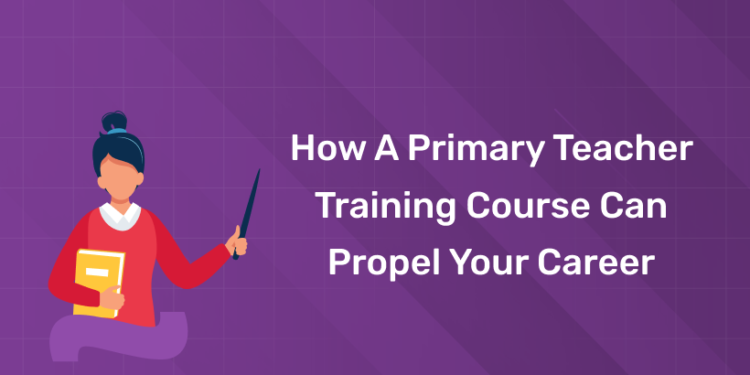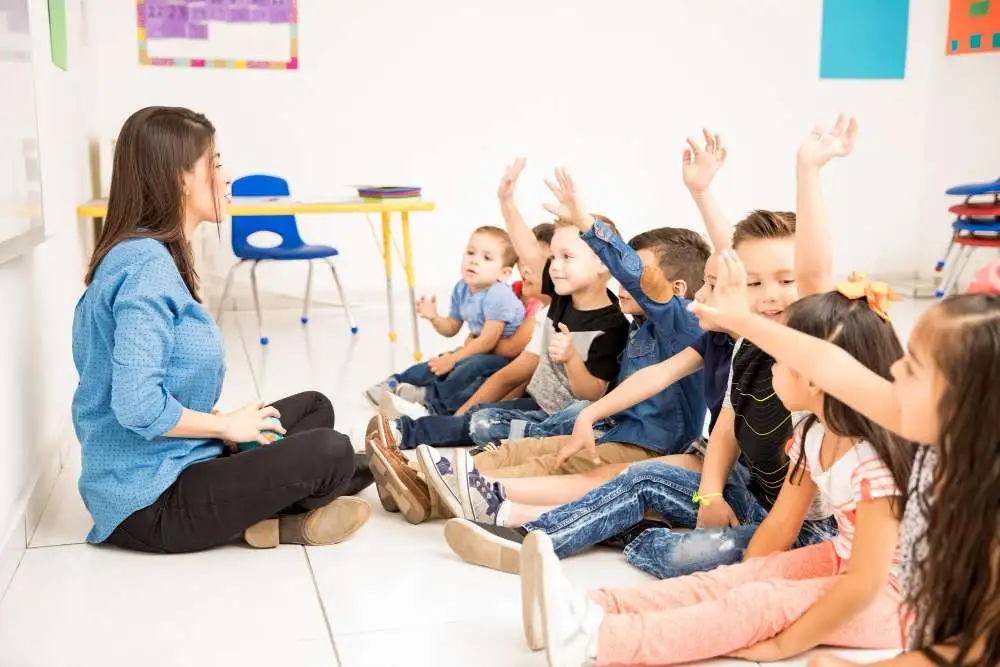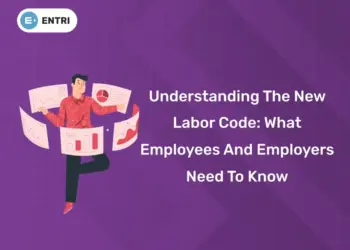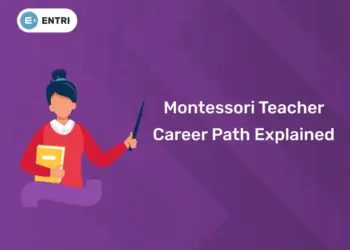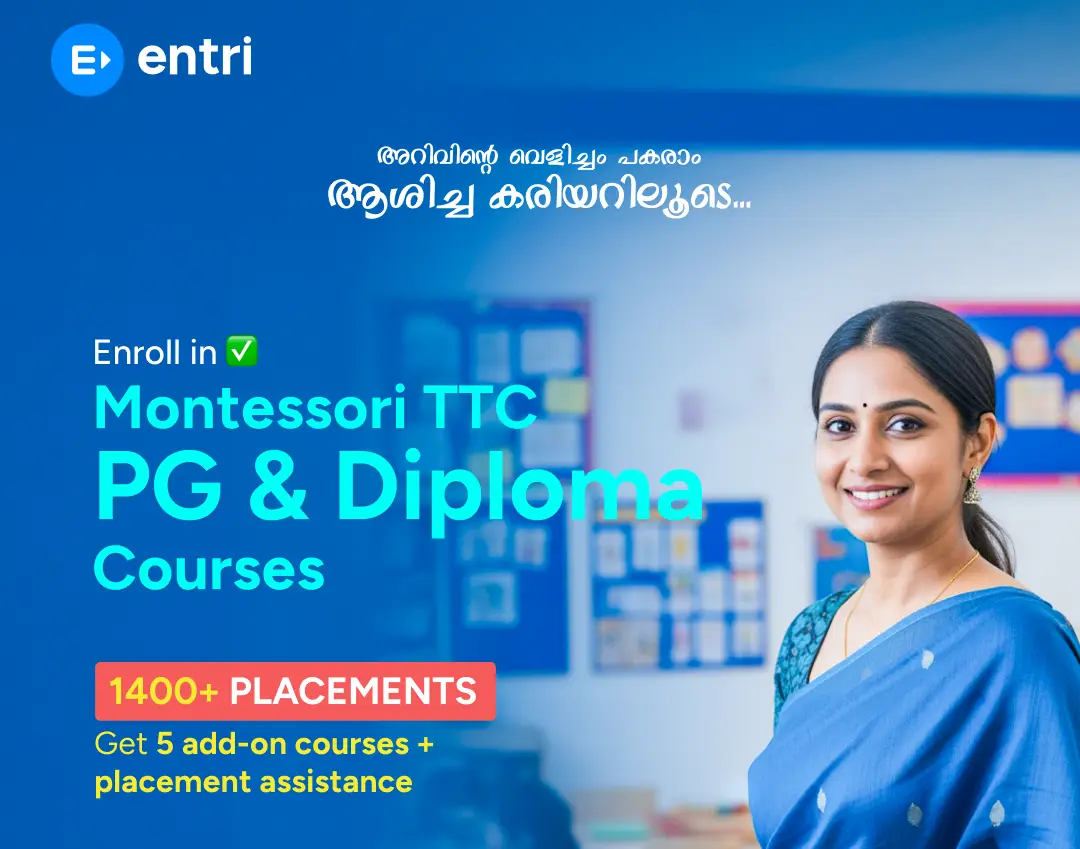Table of Contents
In today’s education landscape, simply having a passion for teaching is not enough. Schools, parents, and students look for educators who bring modern methods, child psychology insight, and confidence in classroom management. That’s where a Primary Teacher Training Course becomes a game-changer, it turns enthusiastic individuals into skilled professionals.
In this post, we’ll explore:
- Why primary teacher training matters in 2025
- The specific benefits it gives to your career
- How combining it with a Montessori TTC (Teacher Training Course), such as the Entri Montessori TTC course, can unlock even more potential
- Actionable advice for teachers and aspiring educators
- Key takeaways to strengthen your path ahead
Before diving into benefits, let’s clarify what a primary teacher training course typically includes and why it remains relevant.
Register for the Entri Elevate Montessori Teacher Training Program! Click here to join!
What is primary teacher training?
A primary teaching training course gives you the crucial skills to teach kids right at the start of their education journey – typically, kids who are 5 to 12 years old. But it’s more than just getting your head around the subject matter – its all about how to teach it, running a classroom, figuring out whether kids are getting it, working with kids who need a bit more help, how kids learn and grow, and how to design what they learn.
Some of these courses will give you a diploma or a certificate, while others are part of a bigger university degree. A lot of the time, they’ll mix up theory and some hands-on experience through things like internships, trying out bits of a lesson in front of a small group (microteaching), and going out into schools to watch other teachers at work.
Why It’s Still So Important:
- Expectations are sky high from parents, schools, and regulators – nowadays it’s not good enough to just love teaching, you need to have been formally trained to do the job properly.
- Education policy is changing – initiatives like India’s NEP 2020 really hammer home the importance of having top-notch teachers who are constantly learning & improving.
- The students we’re teaching now are different – classrooms are more diverse than ever, with kids learning at different speeds, with different needs, from different backgrounds – you need some serious tools and strategies to get by in this kind of environment.
- Technology is changing everything – online learning, apps, digital platforms – all these tools are becoming more & more important – but only if you know how to use them. That’s where formal training comes in.
- Getting ahead in your career – in a super competitive job market its easy to get lost in the crowd – but having a proper qualification under your belt really gives you a leg up, and can open doors to better schools and leadership roles.
How a Primary Teacher Training Course Elevates Your Career
1: What is the primary focus of the first plane of development in the Montessori method?
Let’s drill down into specific transformative benefits. These are relevant both for “normal people” (those considering a teaching career) and seasoned teachers seeking growth.
1. Pedagogical mastery & methodological variety
Training exposes you to multiple teaching methods, not just rote lecturing but activity-based learning, project learning, inquiry-based approaches, differentiated instruction, collaborative learning, etc.
You also learn to teach like kids learn, from concrete to abstract, scaffolding, manipulatives, and formative assessments.
By nailing these, your courses become more compelling, efficient, and adaptable for all students. Students respond more enthusiastically, and your student-teacher glow elevates.
2. Confidence & classroom management
One of the most difficult new teacher initiations is managing a class, handling behavior, maintaining student interest, disciplining equitably, herding transitions, and setting up routines.
Training provides frameworks, strategies, and real-world practice in management techniques, so you can walk into a class confident that you can maintain order while promoting a positive environment.
When you play the role of the steady captain at the helm in class, students trust you more, and learning flows more smoothly.
3. Understanding child development & psychology
Figuring out why kids behave, learn, or misbehave is just as important as knowing how to instruct them. Training immerses you in prenatal, infant, and toddler development, childhood emotional and social stages, cognitive developmental stages, and special needs.
This knowledge allows you to recognize learning difficulties as they emerge, tailor interventions, and cultivate an empathetic, nurturing classroom.
4. Inclusive & equitable education skills
Today’s classrooms need to be all-encompassing, welcoming children with numerous learning disabilities, backgrounds, and struggles. With training, you learn differentiated instruction, UDL and how to support kiddos with special needs or language barriers.
That just makes you a tougher, more adaptable teacher everywhere–city schools, countryside, special ed.
5. Technological & digital integration
Teacher training today is often made up of digital pedagogy modules: using e-learning platforms, apps, smart boards, hybrid teaching, online tests and blended learning.
This allows you not just to handle disruptions (e.g., pandemics) but also to connect with progressive schools looking for 21st-century educators.
6. Access to better career opportunities
With formal training:
- You can qualify for prestigious private and international schools.
- You can be elevated to lead grades, head teacher, or curriculum co-ordinator.
- You can also specialize in roles such as educational content creator, teacher trainer, and course designer.
- You do better in tenders, or govt school, or NGOs
- You can bring to bear better pay and respect.
7. Continuous professional development mindset
A training course can ignite a habit of reflection, peer learning, feedback culture, and lifelong growth. Once you’ve experienced structured study for teachers, you’ll be inclined to stay up to date, join teacher communities and reinvent yourself, which keeps you relevant for decades.
8. Reduced burnout & greater job satisfaction
When you have strategies and planning tools and behavior management and confidence, you’re less stressed. A lot of untrained teachers flame out from frustration and repeated struggle.
With practice, teaching is more rewarding, you have better student achievements, reduced classroom conflict, and deeper fulfillment in your influence.
Get Certified & Start Your Montessori Career
Montessori Teacher Training Course by Entri App: Gain expert skills, earn certification, and kickstart your teaching career.
Join Now!Why Primary Teacher Training is so critical?
1. It Establishes a Hard Academic Foundation
Kids age 3 to 10 are sponges when it comes to learning. Their emotional and intellectual foundation during this time period dictates how they end up performing in life. Experienced educators understand how to cultivate inquisitiveness, rigor, and ingenuity, all the while keeping it fun.
2. It Improves Classroom Effectiveness
Teaching is not about standing in front of a blackboard; it’s about communication, patience, and adaptability. With professional training, you learn active learning strategies and behavioural management techniques and how to craft interactive lesson plans that keep students engaged.
3. It Opens Global Opportunities
A qualified primary teacher is sought after not only in India but in international schools as well. Most international schools also prefer Montessori or early childhood-certified teachers, which makes it even more straightforward to snag international gigs.
4. It Strengthens Your Professional Credibility
With India’s educational reforms and NEP 2020 laying stress on quality early education, schools are moving towards hiring professionally trained teachers with formal training and certified qualifications. A PTTC certificate immediately enhances your status and marketability.
Why Pairing Primary Training with Montessori TTC Makes You Stand Out
If a primary teacher training course gives you general competence, a Montessori TTC adds a specialized, child-centered edge. The Montessori philosophy emphasizes self-directed learning, observation, mixed-age grouping, and a prepared environment.
Here’s how combining both can accelerate your impact:
Montessori complements primary education principles
Since Montessori is widely accepted in early childhood and primary settings, having a Montessori qualification enhances your skills in fostering autonomy, self-motivation, and deeper engagement.
In other words, you bring both the methodological breadth (from primary teacher training) and the depth of child-centred philosophy (from Montessori).
Entri Montessori TTC: An ideal upskilling path
One excellent option in India is the Entri Montessori TTC course (Teacher Training Course). Here’s how it aligns with the goals above:
- 6-month duration: The course typically runs for six months, combining theory, practical, and internship components.
- Flexible mode: Live and recorded sessions allow working professionals to balance schedules.
- Global certifications: Entri’s course offers recognition via bodies like CEED International, UK associations, etc.
- Placement support: The course includes or helps with placements in preschools and Montessori institutions.
- Jobs across locations: Whether you are in Kochi, Trivandrum, Calicut, or elsewhere in Kerala/India, Entri offers the course in regional centers and online.
- Comprehensive curriculum: You’ll cover Montessori philosophy & method, preschool education, management, internship, observation skills, and examination/viva.
- Lower entry barrier: Even those with career breaks or with minimal prior experience can enroll (eligibility from 10th/12th with minimum marks).
By coupling your foundational primary teacher training with the Montessori specialization, you become a dual-qualified educator, fluent in both general classroom strategies and the nuanced Montessori approach. This gives you a competitive edge in early childhood and primary education sectors.
Get Certified & Start Your Montessori Career
Montessori Teacher Training Course by Entri App: Gain expert skills, earn certification, and kickstart your teaching career.
Join Now!How to Choose a Course & Build Your Path
Here’s a practical roadmap for those interested in using training to take your career onward.
Self-assessment & goal setting
- Ask yourself: Which age groups do I enjoy teaching (preprimary, primary)?
- What kind of schools do I want (Montessori, conventional, international)?
- Do I prefer classroom teaching, content development, or teacher training roles?
- How many hours per week can I devote during training (if working currently)?
Your answers will guide whether you need full primary training first, Montessori specialization, or both in parallel.
Research and shortlist courses
Key factors to check:
- Accreditation & recognition: The certificate should carry weight with schools and boards.
- Blend of theory & practice: Ensure internship/observation components are inbuilt.
- Flexibility & delivery mode: Live or recorded sessions, weekend classes, etc.
- Faculty quality: Trainers who are experienced in real classrooms, not just academics.
- Placement support & alumni success: What past students have achieved.
- Cost & duration: Make sure the course fits your time and budget.
If you are in Kerala or nearby regions, Entri’s Montessori TTC is already available in Kochi, Trivandrum, Calicut etc.
Order your learning timeline
- If new to teaching: Start with a general primary teacher training course first, then layer Montessori TTC.
- If already teaching or with basic education: You may take both in parallel (if workload allows).
- Use course breaks or weekends for handson teaching practice or volunteering.
- Maintain a reflective journal, note challenges, classroom observations, and ideas to try.
Lean into mentorship & communities
- Join teacher networks (local and online) to exchange ideas, lesson plans, and challenges.
- Connect with Montessori-trained teachers who can mentor your practical implementation.
- Request classroom observations in reputable Montessori schools to see best practices live.
Build a portfolio
- Document lesson plans, classroom projects, student feedback, and your reflections.
- Include case studies: how you handled a challenging student, how you differentiated instruction, etc.
- Use your portfolio during interviews for teaching jobs or training roles, it sets you apart.
Market yourself as a dual-skilled educator
- On your resume, highlight both general primary training and Montessori specialization.
- In interviews, emphasize how you can bring child-centered approaches even in conventional classrooms.
- Offer workshops, summer camps, or afterschool Montessori-style programs to gain credibility and income.
Hypothetical Scenario: Before vs After Training
| Aspect | Before Primary / Montessori Training | After Training (Primary + Montessori TTC) |
| Lesson planning | Mostly textbookbased, rigid | Flexible, differentiated, projectbased |
| Student engagement | Passive lectures, drills | Handson, studentled, inquiry |
| Classroom control | Frequent discipline issues | Predictable routines, positive behavior strategies |
| Confidence in teaching | Frequent doubt, dependency on textbooks | Confident adaptation, responsive to students |
| Job prospects | Limited to lowertier schools or untrained roles | Eligible for top preschools, Montessori schools, leadership roles |
| Satisfaction & burnout | Higher stress and frustration | More fulfillment, lower burnout risk |
| Income potential | Basic pay scales | Enhanced pay, specialization bonuses, broader roles |
Key Takeaways from a Primary Teacher Training
- From Potential to Pro: A primary teacher training course doesn’t just hand you a certificate, it gives you the real deal: methodology that’s actually going to work, an understanding of psychology that you can use to connect with kids, management skills to keep your classroom on track, and above all, a whole lot more confidence to back it up.
- Child-Centred Teaching Just Got a Whole Lot More Real: The Entri Montessori TTC course is a practical way to get your hands on the knowledge and skills you need to be a true specialist in child-led learning.
- Don’t Just Be a Teacher – Be a Highly Valued One: Schools know what they’re looking for – teachers who can seamlessly merge the conventional with the unconventional. And a dual qualification in Montessori is exactly what sets you apart from the rest.
- Plan Your Route Wisely: Whether you’re looking at courses, budgets, or just plain old-fashioned time, make sure you’re matching your upskilling to your goals and your reality.
- Theoretical Know-How is Only Half the Picture: You can learn all about teaching, but unless you’re putting it into practice and reflecting on it at every stage, you might as well not be doing it at all.
- The World of Education is Always on the Move: If you want to stay relevant and on top, you need to commit to a training mindset that keeps you in the loop and keeps you ahead of the game.
Final Thought:
If you have a heart for teaching, don’t let passion be your destiny. A good Primary Teacher Training Course provides you with the background, confidence, resources, techniques, and authority. But combining that with a Montessori TTC, supercharges your ability to truly reach kids, craft impactful learning experiences, and stand out in a crowded market.
And even if you’re mid-career, the move to upskill is never too late. The change you observe in your pupils, your work life, and your career will be obvious. Begin with focused objectives, select classes judiciously, train religiously, and allow your double education to become your calling card.
| Also Read | |
| 5 Ways Montessori Teacher Training Benefits Children | |
| What Qualifications Do You Need for Kindergarten Teacher Jobs? |
|
| Montessori Pink Tower Making | |
| Knobbed Cylinders in Montessori | |
Get Certified & Start Your Montessori Career
Montessori Teacher Training Course by Entri App: Gain expert skills, earn certification, and kickstart your teaching career.
Join Now!Frequently Asked Questions
Why should I pursue a primary teacher training course?
It equips you with modern pedagogical skills, classroom management techniques, and enhances your employability and salary prospects in schools across India and the Gulf.
What is the difference between a primary teacher training course and Montessori training?
Primary teacher training focuses broadly on general school teaching skills, while Montessori training specializes in the child-centered Montessori method, emphasizing creativity and independence.
Can a primary teacher training course help me get jobs abroad?
Yes, especially courses like Entri’s Montessori TTC, which are internationally recognized and help open opportunities in foreign schools, including in the Gulf countries.
How long does a primary teacher training course usually last?
The duration varies from 1 to 2 years for diplomas, while some certificate courses may be shorter depending on the program.
Do I need prior teaching experience to enroll in a primary teacher training course?
Not necessarily. Many courses welcome fresh graduates and working professionals alike who want to upskill or start a teaching career.
How does Entri’s Montessori TTC course support career advancement?
It blends theoretical and practical training aligned with international Montessori standards and offers placement assistance in reputed schools in India and the Gulf.


